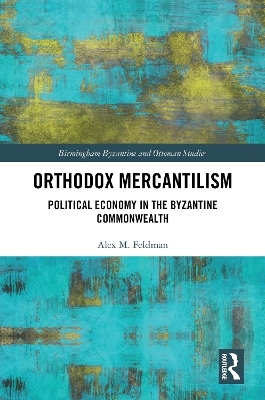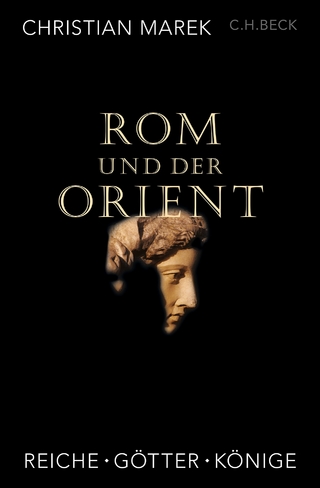
Orthodox Mercantilism
Routledge (Verlag)
978-1-032-37669-1 (ISBN)
This book demonstrates how the political economy of mercantilism was not simply a Western invention by various cities and kingdoms during the Renaissance, but was the natural by-product of perpetually limited growth rates and rulers’ relentless pursuits of bullion. It contributes to discussions of the economic history surrounding the so-called “Great Divergence” between East and West, which would consequently lend context and credence to differences of economic thought in the world today. Additionally, it seeks to explain present economic thought as tacitly derived from implicit antique paradigms. This book advances fields of research from numismatics and sigillography to historical materialism and historical political economy.
Divided into three parts, Orthodox Mercantilism first examines the political theology (the sovereignty) of the œcumene from the early 11th century. Second, it analyzes its peripheral legislation from the customary laws of newly Christianized dynasties up to the Kormčaja Kniga’s adoption (the Nomokanon) by 13th-century Orthodox dynasties across Eastern Europe. Third, it explores how these dynasties (and their own satellite dynasties) hoarded finite bullion to pay for defense, resulting in the 11–14th-century coinless period across Eastern Europe and Western Eurasia.
Appealing to students and scholars alike, this book will be of interest to those studying and researching economic and mercantile history, particularly in the context of Byzantine and Eastern European societies.
Alex M. Feldman is the chair of the department of languages and literature at CIS-Endicott International University of Madrid. He received a BA from Roger Williams University of Rhode Island and received an MRes and PhD from the University of Birmingham. He has held a postdoctoral fellowship at the University of London’s Warburg Institute and has taught at the Rosenbaum Yeshiva of North Jersey, the State University of New York, Rockland and the University of Birmingham.
Prologue: A zero-sum world
Pronoia: Orthodox feudalism?
Mercantilism 101
What was the “Byzantine Commonwealth”?
Byzantium: nation-state or civilization-state?
Did Byzantium generate a “commonwealth”?
How should the œcumene be interpreted?
The Œcumene
Chapter 1: The Byzantine Commonwealth unfolds
Byzantium and the baptism of Vladimir, 986–989 – the problems of the sources
The evidence of Cherson’s involvement in the Phokas rebellion, 987–989
A reassemblage of the revisionist hypothesis, 987-989
Chapter 2
The Rus’ian metropolitanate: “proto-state” or exarchate?
Beyond Commonwealth
Byzantine Western exarchates of the 6th–8th centuries
The loyalty of the thema of Bulgaria after 1019
The metropolitanate of Rus’ia reconsidered
The Law
Chapter 3: From customary law to Christian law
The Russkaja Pravda (11th–12th centuries)
Byzantine legal influences in the expanded Russkaja Pravda
The adoption of the Zakon Sudnyj Ljudem (9th–12th centuries)
From the Zakon Sudnyj Ljudem to the Kormčaja Kniga
Chapter 4
Overlapping sovereignties: Empire, commonwealth and jurisdiction
Orthodox tax, debt and property law to the 13th century
Orthodox tax, debt and property law since the 13th century
The Coin
Chapter 5: The hoarding period: Eastern Europe, 11th–14th centuries
Bullion, deniers and debasement
Barter, debt and law
Imagined borders
Chapter 6: Sovereignty and bullion: 13–17th centuries
Coins of the Romanía dynasties
Coins of the Œcumene dynasties
Epilogue: Cycles of Divergence and convergence
Misconceptions of feudalism and mercantilism
The misconception that Roman laws and feudal laws have been different
The misconception that feudalism has been exclusive to Latin Christendom
The misconception that feudalism and mercantilism have been mutually exclusive economic systems
The contested inheritance of Byzantium’s political economy and rhetoric
Orthodox ecumenism
Rex Catholicissimus, the Spains and “The Powerful Mr. Money”
Pravoslavie, the Russias and “The Artery of War - Money”
The Great Divergence?
Ecumenical sovereignty and the national idea
Liberal interpretations of zero-sum economic history
Bibliography
Primary Sources
Secondary Sources
Index
| Erscheinungsdatum | 05.04.2024 |
|---|---|
| Reihe/Serie | Birmingham Byzantine and Ottoman Studies |
| Zusatzinfo | 3 Halftones, black and white; 3 Illustrations, black and white |
| Verlagsort | London |
| Sprache | englisch |
| Maße | 156 x 234 mm |
| Gewicht | 730 g |
| Themenwelt | Geisteswissenschaften ► Archäologie |
| Geschichte ► Allgemeine Geschichte ► Altertum / Antike | |
| Geschichte ► Allgemeine Geschichte ► Mittelalter | |
| ISBN-10 | 1-032-37669-4 / 1032376694 |
| ISBN-13 | 978-1-032-37669-1 / 9781032376691 |
| Zustand | Neuware |
| Informationen gemäß Produktsicherheitsverordnung (GPSR) | |
| Haben Sie eine Frage zum Produkt? |
aus dem Bereich


